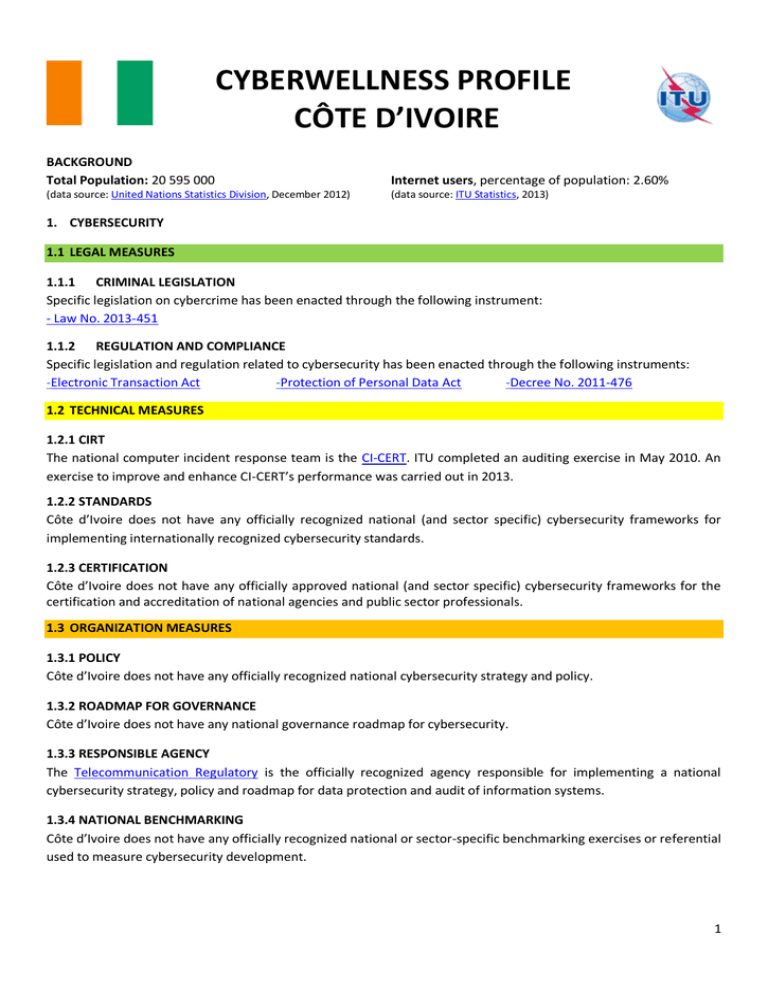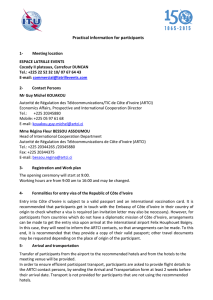CYBERWELLNESS PROFILE CÔTE D’IVOIRE
advertisement

CYBERWELLNESS PROFILE CÔTE D’IVOIRE BACKGROUND Total Population: 20 595 000 Internet users, percentage of population: 2.60% (data source: United Nations Statistics Division, December 2012) (data source: ITU Statistics, 2013) 1. CYBERSECURITY 1.1 LEGAL MEASURES 1.1.1 CRIMINAL LEGISLATION Specific legislation on cybercrime has been enacted through the following instrument: - Law No. 2013-451 1.1.2 REGULATION AND COMPLIANCE Specific legislation and regulation related to cybersecurity has been enacted through the following instruments: -Electronic Transaction Act -Protection of Personal Data Act -Decree No. 2011-476 1.2 TECHNICAL MEASURES 1.2.1 CIRT The national computer incident response team is the CI-CERT. ITU completed an auditing exercise in May 2010. An exercise to improve and enhance CI-CERT’s performance was carried out in 2013. 1.2.2 STANDARDS Côte d’Ivoire does not have any officially recognized national (and sector specific) cybersecurity frameworks for implementing internationally recognized cybersecurity standards. 1.2.3 CERTIFICATION Côte d’Ivoire does not have any officially approved national (and sector specific) cybersecurity frameworks for the certification and accreditation of national agencies and public sector professionals. 1.3 ORGANIZATION MEASURES 1.3.1 POLICY Côte d’Ivoire does not have any officially recognized national cybersecurity strategy and policy. 1.3.2 ROADMAP FOR GOVERNANCE Côte d’Ivoire does not have any national governance roadmap for cybersecurity. 1.3.3 RESPONSIBLE AGENCY The Telecommunication Regulatory is the officially recognized agency responsible for implementing a national cybersecurity strategy, policy and roadmap for data protection and audit of information systems. 1.3.4 NATIONAL BENCHMARKING Côte d’Ivoire does not have any officially recognized national or sector-specific benchmarking exercises or referential used to measure cybersecurity development. 1 1.4 CAPACITY BUILDING 1.4.1 STANDARDISATION DEVELOPMENT Côte d’Ivoire does not have any officially recognized national or sector-specific research and development (R&D) programs/projects for cybersecurity standards, best practices and guidelines to be applied in either the private or the public sector. 1.4.2 MANPOWER DEVELOPMENT Côte d’Ivoire does not have any officially recognized national or sector-specific educational and professional training programs for raising awareness with the general public, promoting cybersecurity courses in higher education and promoting certification of professionals in either the public or the private sectors. However the Training Center Computer Security CI-CERT (CFSI) will be set up. This organization will be responsible to provide programs at school and university as well as certification programs in cybersecurity. 1.4.3 PROFESSIONAL CERTIFICATION Côte d’Ivoire has 12 public sector professionals certified under internationally recognized certification programs in cybersecurity. 1.4.4 AGENCY CERTIFICATION Côte d’Ivoire does not have any certified government and public sector agencies certified under internationally recognized standards in cybersecurity. 1.5 COOPERATION 1.5.1 INTRA-STATE COOPERATION Côte d’Ivoire does not have any officially recognized partnerships to facilitate sharing of cybersecurity assets across borders or with other nation states. 1.5.2 INTRA-AGENCY COOPERATION Côte d’Ivoire does not have any officially recognized national or sector-specific programs for sharing cybersecurity assets within the public sector. 1.5.3 PUBLIC SECTOR PARTNERSHIP Côte d’Ivoire has 12 officially recognized national or sector-specific programs for sharing cybersecurity assets within the public and private sector. 1.5.4 INTERNATIONAL COOPERATION Côte d’Ivoire is a member of the ITU-IMPACT initiative and has access to relevant cybersecurity services. As a member of the African CERT, Côte d’Ivoire is involved in the promoting of preventive measures and coordinating of cyber security response in the event of cyber incidents. Côte d’Ivoire is among the beneficiaries of the EU/ITU cofunded project “Support for Harmonization of the ICT Policies in Sub-Sahara Africa” (HIPSSA). 2. CHILD ONLINE PROTECTION 2.1 NATIONAL LEGISLATION Specific legislation on cybercrime has been enacted through the following instrument: -The Criminal Code (Article 334, 337 and 338) 2.2 UN CONVENTION AND PROTOCOL Côte d’Ivoire has acceded, with no declarations or reservations to articles 16, 17(e) and 34(c), to the Convention on the Rights of the Child. 2 Côte d’Ivoire has acceded, with no declarations or reservations to articles 2 and 3, to the Optional Protocol to The Convention on the Rights of the Child on the Sale of Children, Child Prostitution and Child Pornography. 2.3 INSTITUTIONAL SUPPORT Côte d’Ivoire Computer Incident Response Team (CI-CERT) is the officially recognized agency that offers institutional support on child online protection. 2.4 REPORTING MECHANISM Côte d’Ivoire does not have any officially recognized agency that offers an avenue for the reporting of incidents related to child online protection. However there is a helpline “SOS enfant en détresse”: 800 800 80. ----------------------------------------------------------------------------------------------------------------------------------------------------------DISCLAIMER: Please refer to http://www.itu.int/en/Pages/copyright.aspx More information is available on ITU website at http://www.itu.int/en/ITU-D/Cybersecurity/Pages/default.aspx Last updated on 12th August 2014 3


